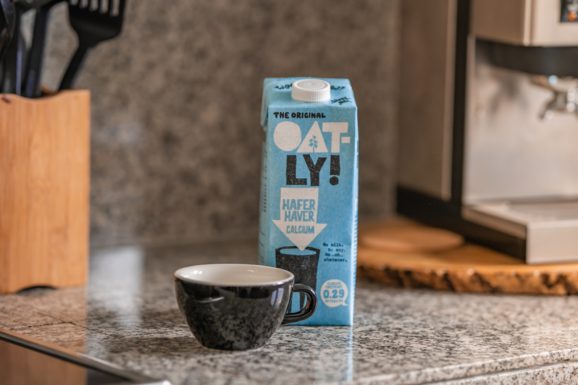Recent studies have shown that across all generations, consumers expect retailers and brands to become more sustainable.
Many consumers, especially those who are considered Gen Z and Millennials are even willing to spend more money on a product they believe is sustainable. But it can be difficult to know which choice is the best choice when it comes to reducing your environmental impact. That’s why some companies are choosing to increase their transparency and empower their consumers through carbon labeling.
Carbon labeling, or carbon emissions labeling, shows how much carbon dioxide is emitted as a result of a product’s manufacturing, transport, and disposal. These values are expressed in carbon dioxide equivalents (CO2e). For example, Oatly’s oat milk has a carbon footprint of 0.31 kg CO2e per kg. This number takes into account the carbon emissions from the farms, factories, packaging, and transport of the oat milk. Seeing this value, when compared to cow’s milk, which on average produces 1.58 kg CO2e per kg helps climate-conscious consumers make decisions about which product has a lesser negative impact on the environment.
In September of this year, Just Salad became the first U.S. restaurant chain to carbon label its menu. Sandra Noonan, Chief Sustainability Officer of Just Salad shared that “a calorie label simply isn’t enough anymore—we need to know how our food choices affect our well-being at a planetary level.” She continued: “Our new carbon labels will provide that insight, helping guests make more holistic choices that take climate change into account.” Panera Bread has since followed suit by creating a “Cool Food Meal” badge to indicate items on their menu with a carbon footprint of fewer than 5.38 kilograms of carbon dioxide.
And while food consumption accounts for about a quarter of the planet’s carbon emissions, carbon labeling is not limited to just food and beverages. Allbirds, most popularly known for their sneakers, carbon labels each of their products as part of their plan to eliminate their carbon footprint by measuring, reducing, and offsetting.
These brands are hoping that others will join them in their cause. Oatly’s website even goes as far as to say that they “believe consumer empowerment should be a law, if not a human right.” Providing consumers with information creates a system of transparency and accountability and allows them to make conscious decisions about how they spend their money. As the age-old adage goes, “knowledge is power.”
